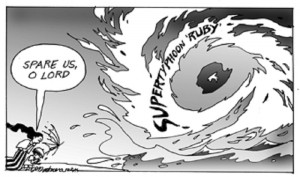The evolving popular thinking—earlier echoed by Energy Secretary Jericho Petilla—that the removal of the Pandacan oil depot will definitely increase the local pump prices of petroleum products particularly in Metro Manila, should be taken with a grain of salt.
Petilla must obviously have in mind the cost of transporting oil through lorries or tank trucks from the oil source to the gas stations. As none of the three oil companies has yet formally announced where they intend to relocate, the reasonable assumption is that Shell and Petron would be supplying the daily oil needs of their gas stations through tank trucks emanating from their Batangas and Bataan refineries.
The related implications on Caltex may not be as worse. The closure many years ago of its Batangas refinery and more recently of the erstwhile Batangas-Manila pipeline system has essentially made the Pandacan oil depot relatively less useful to Caltex than to Shell and Petron. Maybe—just maybe—Caltex has all the while been supplying its Metro Manila stations through lorries from Batangas and/or through the time-tested borrow-and-loan arrangement among the local oil companies. That is, Shell or Petron supplies Caltex stations and Caltex repays them through its Pandacan or other terminals elsewhere in finished oil that it had since been directly importing.
Whichever is beside the point—the point being: Petilla need not prematurely alarm the public by saying the price of oil will rise after the closure of the Pandacan depot. That simply defies logic!
As things are, the prevailing price of oil in Metro Manila already includes a transport cost element: either in terms of barging or pipeline fees. With the Pandacan oil depot out, these transport costs will no longer apply, and will be replaced—repeat, just replaced—by the cost of shipping oil via lorries. It is not known whether these two costs are exactly the same. But whatever the difference should not be too significant for the buying public to seriously worry about.
What, in my view, would be more worrisome is the unthinkable traffic congestion that the closure of the Pandacan oil depot will create between Batangas-Bataan and Metro Manila. In turn, with truck bans that not only the South and North Luzon expressways but also many cities and municipalities in between are expected to impose, an unhampered supply of oil in the metropolis cannot be guaranteed.
Alas, who could have ever imagined, indeed, that the impact of the traffic congestion occasioned by Erap’s truck ban in the city of Manila will soon be felt practically in the whole of Luzon?
—RUDY L. CORONEL,
rudycoronel2004@gmail.com


